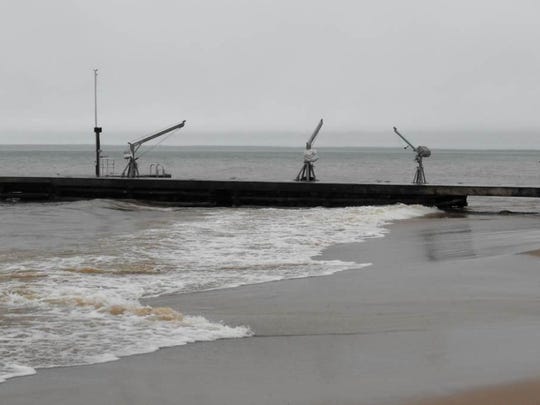Court sides with owner of a Madeline Island vacation home despite concerns his pier is eroding the shoreline
Jan 19, 2019 09:02AM ● By Editor
Pier owner Philip Myers' home as seen from the lot of a neighbor who contends the pier has led to erosion of his beach on Madeline Island. Photo: WI Department of Natural Resources
From the Milwaukee Journal Sentinel - January 29, 2019
The Wisconsin Supreme Court on Friday sided with a Madeline Island vacation home owner and against the Department of Natural Resources, which had demanded the home's massive pier be removed or modified.
The 6-1 decision will save Twin Cities investment manager Philip Myers thousands of dollars but could mean continued shore erosion for his neighbors.
The DNR permitted the 70-foot pier, built on giant rock-filled cribs, in 2001, over the concerns and objections of some other residents. But more than a decade later the agency said the pier was altering the Lake Superior shoreline and had to be modified or removed. Myers appealed and two courts ruled against him.

The state Department of Natural Resources ordered this pier in Lake Superior at Madeline Island removed or modified. The owner fought the order and the Wisconsin Supreme Court ruled in his favor. Photo: WI Department of Natural Resources
The high court's majority, however, found the case pretty clear cut. It said the DNR's 2001 permit to Myers to construct the pier was akin to a building permit that expired when the pier was completed, ending DNR authority over the project.
The court's newest justice, Rebecca Dallet, wrote the majority opinion, emphasizing a statutory text approach often employed by the court's more conservative members. She found nothing in the statute governing navigable waters that gave the DNR ongoing authority over the pier.
"We have ended our practice of deferring to administrative agencies' conclusions of law," she wrote. "It is important to remember that administrative agencies are creatures of the legislature."
The DNR said the 2001 permit was conditional and could be amended if conditions changed. It ultimately found Myers' had to rebuild the pier in a way that would allow much more water and sand to move underneath it or remove the structure entirely, a task Myers' attorney estimated would cost well more than $50,000.
In dissent, Justice Ann Bradley called the majority's claimed reliance on statutory language misleading.
"Although it pays lip service to a plain meaning interpretation, the majority fails to follow it," Bradley wrote, thus reaching "an unreasonable conclusion."
The majority "allows a pier with clear defects to remain in a state of disrepair and impairment of the public interest," she wrote.
"On bodies of water large and small, the majority opinion raises the specter that riparian owners cannot rely on the DNR to protect the public interest if a neighboring pier stops working as intended due to shifting lake conditions."

To read the original articles and related stories, follow this link to the Milwaukee Journal-Sentinel website. https://www.jsonline.com/story/news/local/wisconsin/2019/01/18/lake-superior-private-dock-allowed-st...

